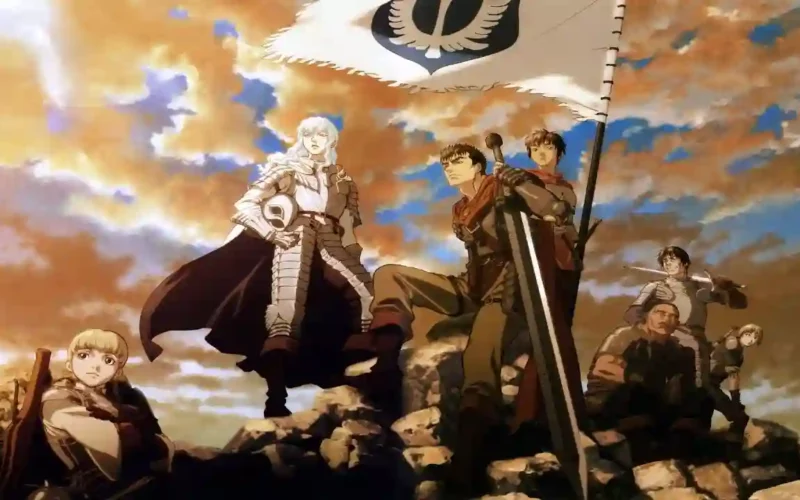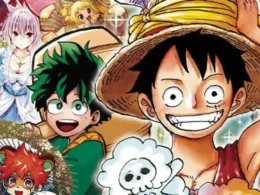Berserk, the dark fantasy masterpiece created by Kentaro Miura, is renowned for its intricate narrative, complex characters, and visceral artistry. At the heart of this epic tale lies a supernatural realm teeming with demons and Apostles, entities that imbue Berserk with an otherworldly and terrifying atmosphere. In this article, we explore the supernatural elements of Berserk, delving into the demonic forces that shape the narrative and add layers of darkness and horror to this exceptional work.
The Eclipse and the Birth of Apostles:
Central to Berserk’s supernatural landscape is the Eclipse, a cataclysmic event that marks a turning point in the series. The Eclipse is a nightmarish ceremony orchestrated by the God Hand, a group of demonic entities that govern the realms of the supernatural. During this unholy ritual, individuals marked with the Brand of Sacrifice are sacrificed, giving birth to grotesque and powerful beings known as Apostles.
Apostles are former humans transformed by the demonic power bestowed upon them during the Eclipse. These monstrous entities range from nightmarish creatures with surreal forms to more humanoid figures with twisted desires. Each Apostle is unique, reflecting the darkness within the human soul and the individual traumas that led to their transformation.
The symbolism of the Eclipse and the creation of Apostles adds a layer of cosmic horror to Berserk. The blending of the human and the demonic blurs the boundaries between the natural and supernatural, contributing to the series’ overall sense of dread and unpredictability.
God Hand: Masters of the Astral Realm:
The God Hand, the enigmatic and malevolent beings overseeing the supernatural aspects of Berserk, are central figures in the series’ overarching narrative. Comprising five members—Void, Slan, Ubik, Conrad, and Femto—the God Hand preside over the Abyss, a dimension known as the astral realm. They manipulate the fates of humans and orchestrate events that shape the course of the mortal world.
The God Hand’s designs and influence on the mortal realm make them formidable and mysterious adversaries. Their appearances are grotesque and surreal, embodying the inherent horror of the unknown. Void, the leader of the God Hand, is depicted as a cloaked figure with a gaping void for a face, adding an element of cosmic horror that resonates throughout the series.
The Astral Realm and the Idea of Evil:
The concept of the astral realm in Berserk is further enriched by the presence of the Idea of Evil, a metaphysical entity that resides within the Abyss. The Idea of Evil is a manifestation of humanity’s collective subconscious, representing the darkest desires, fears, and existential questions of the mortal world.
The inclusion of the Idea of Evil expands the scope of Berserk’s supernatural elements, introducing a cosmic and philosophical layer to the narrative. The very idea that the struggles of mortals are orchestrated by a higher, malevolent force adds depth to the series’ exploration of destiny, free will, and the human condition.
Individual Apostles and Their Tragic Stories:
Beyond the cosmic entities of the God Hand, Berserk delves into the individual stories of Apostles, each with its own tragic narrative. These former humans, transformed by their desires and sacrificed during the Eclipse, become embodiments of the series’ exploration of the darkness within the human soul.
From Zodd, the powerful and bestial Apostle, to the tragic tale of Rosine, whose transformation reflects the harsh realities of a bleak world, Berserk’s Apostles serve as poignant symbols of the consequences of unchecked desires and the pursuit of power. The individuality and depth given to each Apostle contribute to the emotional resonance of Berserk’s supernatural elements, making them more than mere monstrous adversaries but tragic figures caught in the web of their own destinies.
The Brand of Sacrifice: A Symbol of Doom:
The Brand of Sacrifice, a cursed mark given to those chosen for sacrifice during the Eclipse, is a recurring symbol in Berserk. Branded individuals become conduits between the mortal realm and the supernatural, attracting malevolent entities and marking them for a grim fate. The Brand serves as a visual representation of the characters’ connection to the demonic forces that haunt the series.
Guts, the series’ central protagonist, bears the Brand of Sacrifice, and it becomes a central element in his narrative. The Brand not only marks him for constant danger but also serves as a constant reminder of the traumatic events of the Eclipse. The symbolism of the Brand reinforces the inescapable link between the mortal world and the supernatural in Berserk.
The Influence on Dark Fantasy:
Berserk’s supernatural elements have had a profound impact on the dark fantasy genre. The blending of cosmic horror, existential philosophy, and visceral storytelling has inspired subsequent works to explore the darker aspects of fantasy storytelling. Themes of transformation, the consequences of desire, and the clash between the mortal and supernatural realms have become recurring motifs in contemporary dark fantasy.
The iconic imagery of the God Hand, Apostles, and the Brand of Sacrifice has left an indelible mark on the visual language of dark fantasy. Creators in the genre have drawn inspiration from Berserk’s nuanced approach to the supernatural, often seeking to capture the same sense of horror, awe, and philosophical depth.
Conclusion:
Berserk’s supernatural elements are a testament to Kentaro Miura’s ability to weave a narrative that transcends the boundaries of traditional fantasy. The demons, Apostles, and cosmic entities that populate the series contribute to its dark and immersive atmosphere, shaping a narrative that explores the depths of human emotion, the consequences of desire, and the existential mysteries of the universe. Berserk’s impact on the dark fantasy genre is not just in its visceral and fantastical elements but in its ability to elevate the genre to a realm of profound storytelling and supernatural complexity.











